Today, building a successful business or brand requires more than providing customers with high-quality products or services. For a company to truly stand out amongst the competition, both online and off, putting a variety of tools to use is a must. Whether you are launching a brand new business from the ground up or if you are working towards increasing sales for your existing company, there are many ways to help garner a following as well as loyal customers who have a genuine interest in what you have to offer.
One way to help increase your online and local visibility is to host virtual events, such as a virtual webinar of your own. Holding virtual events is not only a way for you to communicate with those who already want to know more about your products and/or services, but it is also a way for you to easily maximize your reach to attract new potential followers, fans, and customers.
What is a Virtual Event?
A virtual event can include everything from a traditional webinar and video conference to a live stream, contest, or even a fundraising gathering online. Learning more about hosting a virtual event and what types of events may be hosted can help you when brainstorming a virtual event marketing strategy for your company.
Types of Virtual Events
Before getting started with the planning of an upcoming virtual event for your business, it is best to get to know more about all of your options. Some of the most popular types of virtual events that are optimal for businesses and brands in most industries include:
- Virtual classes: Host a virtual class to showcase your own skills and abilities to those in need. Classes can help to garner a loyal following as you establish credibility as a professional or as a reliable brand.
- Tutorials: If you want to share your skills and abilities, you can also do so when holding virtual events that share tutorials, walkthroughs, and in-depth guides.
- Training: Are you interested in teaching others how to build a business of their own or how to land their dream position? Hosting courses and training sessions is also possible when you host virtual events for your business.
- Live Streams: Live Streams have become more popular than ever, providing individuals and brands alike with the ability to connect and communicate with their audience on a more intimate and personal level. You can use live streams to promote a new product or even to interact and engage with your loyal followers, fans, customers, and clients.Here is an example of a live stream where the people just sit and answer questions they get live from their audience:
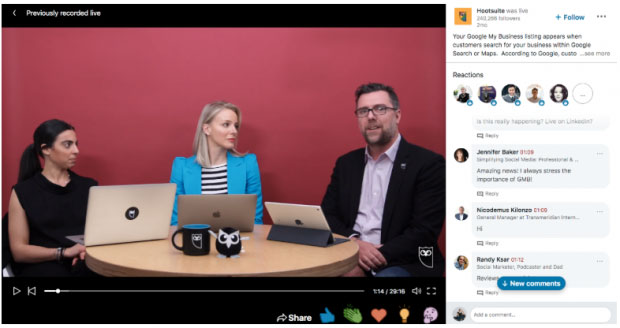
(Image Credit: Hootsuite Blog)
- Interviews: Are you planning to host an interview that is buzz-worthy or likely to be of interest to your target audience and the demographics you want to reach? Consider hosting a virtual event including your interview to garner attention and to attract viewers while spreading the word about your business to those online.
- Conferences: Hosting a conference is another way to go about holding virtual events, especially if you wish to connect with as many individuals as possible during your virtual event. Hosting conferences can also help you to establish credibility as you build your brand’s reputation online.
- Contests and Giveaways: Use virtual events to host contests and giveaways, which are likely to incentivize your followers to learn more about your brand or to engage and interact with your page and your posts. By hosting contests and giveaways, you not only increase your chances of receiving more traffic and garnering more views, but you are also helping to increase your brand’s overall visibility and spread online, regardless of the platform(s) you choose to use. For example:

(Image Credit: Eventbrite)
Before learning how to host virtual events for your own business, it is highly advisable to use the following steps as a guide towards hosting virtual events that are sure to deliver.
1. Consider Your Objective(s)
In order to truly know how to host a virtual event, you must first understand the objective(s) you have in mind for your brand. Not all virtual events are the same and are likely to attract the same audience, which is why clarifying your main objective and the purpose of your virtual event ahead of time is a must.
Consider the following when you are in the planning stages of an upcoming virtual event you intend to host:
- Purpose: What is the purpose of the virtual event you intend to host? Are you trying to simply spread the word about your business, or are you attempting to garner new clients and customers? Do you want to increase the number of followers you have on social media, or are you more interested in boosting the overall SEO, or search engine optimization for your official website and domain?
- Audience: Who do you want to reach with your virtual event? What audience are you intending to target with your virtual event, and why? What demographics do you want to reach? What age range, gender, and location are you honing in on with your virtual event(s), and why? Are you interested in targeting a specific neighborhood, zip code, or region?
- Problem-Solving: Is your virtual event going to help with problem-solving in the lives of your followers and prospective customers? Problem-solving is often a key element in any successful marketing or digital event strategy, which is why it is imperative to address which problems you intend to solve ahead of time before you begin marketing and promoting your event to followers.
- Addressing Pain Points: What pain points do you plan to address with the virtual event you intend to host for your business? Are you providing resources for individuals, savings, or even the potential of a debt-free future? Consider which pain points are most likely impacting and negatively affecting your target audience while devising a strategy for your virtual event.
- How: How will you go about reaching your intended audience? Are you planning to use an email newsletter, your website’s official blog, a PPC (pay-per-click) campaign, or even social media marketing? How will you maximize your ability to reach those who may have a genuine interest in the products or services your business provides?
Improve your content marketing + SEO in 60 seconds!
Diib uses the power of big data to help you quickly and easily increase your traffic and rankings. We’ll even let you know if you already deserve to rank higher for certain keywords.
- Easy-to-use automated SEO tool
- Get new content ideas and review existing content
- Checks for content localization
- SEO optimized content
- Built-in benchmarking and competitor analysis
- Over 500,000k global members
Used by over 500k companies and organizations:
Syncs with 
2. Timing
Whenever you intend to host a virtual event, it is advisable to take timing into consideration, especially if you plan to host your event during a busy season of the year or if your event surrounds a time-sensitive matter. Timing can mean the difference between a successful campaign and wasting your time and efforts. If you use social analytics tools it is much easier to figure out when the perfect time to host your event, for instance:
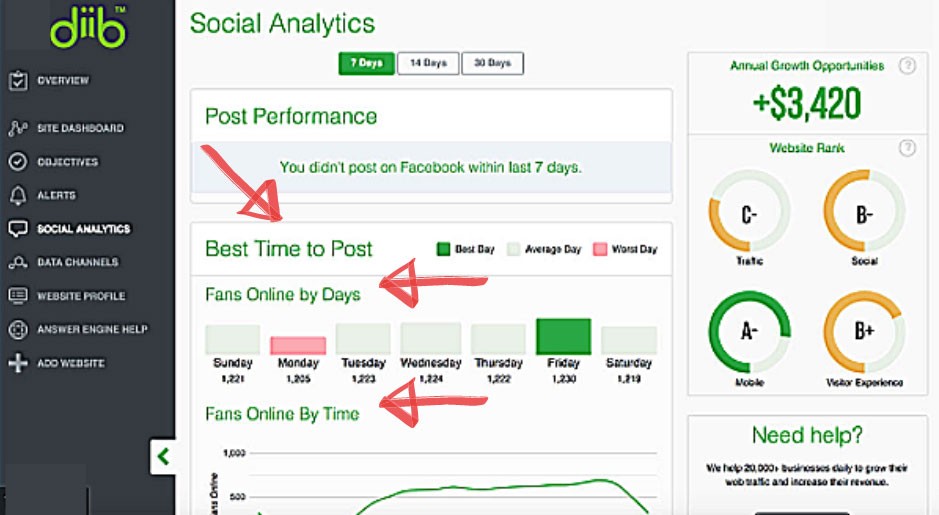
While brainstorming which dates and times are likely to work best for your upcoming event, keep in mind the daily lives and average routines of the audience you are targeting and attempting to reach. Some tips to keep in mind when selecting an optimal date and time for a virtual event you are hosting include:
- Time Zones: Take time zones into consideration when scheduling a virtual event, especially if you are expecting attendees from various regions and zones around the country and even around the world. You may want to host multiple events involving the same content if your audience is massive and situated around the globe.
- Planning Ahead: When hosting an upcoming virtual event, send out reminders and invitations to prospective attendees and followers of your weeks and even months in advance.
- Avoid Conflicts: Avoid hosting any virtual event on a date that may include competing events or holidays that are celebrated by the masses. Always research your current competition to ensure that your preferred virtual event or webinar’s date has not already been promoted by another individual or business.
3. Promotions and Marketing
One of the most important aspects of hosting any type of virtual event is the marketing that goes into promoting the event itself. Promoting your event anywhere from two to three weeks prior to your event date itself is one of the best ways to increase the number of registrations and reservations your event receives.
Developing a marketing strategy for your virtual event will highly depend on the type of users you intend to reach as well as the platforms you intend to use to promote your upcoming virtual event.
You Might Also Like
When creating your marketing strategy, consider which platforms such as Facebook, Twitter, Instagram, and even third-party platforms such as Google Adwords that you plan to use to promote your event.
Will you be using tools such as Facebook Ads as well as Instagram Ads to launch your upcoming campaign, or do you intend to garner interest in your virtual event organically and by increasing engagement and incentivizing users to follow your business and brand? The image below shows what a Facebook Ad might look like for promoting a virtual event:
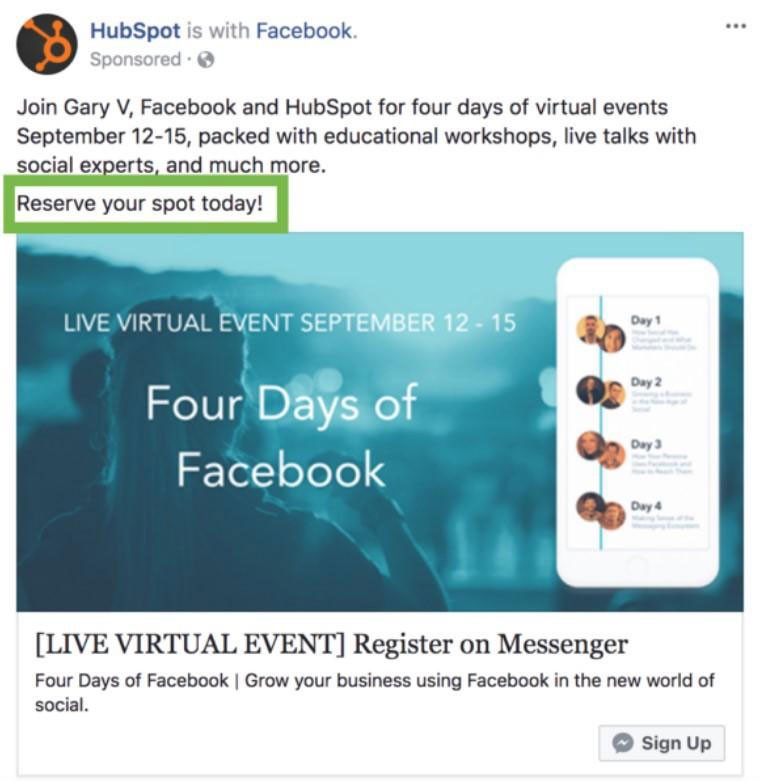
(Image Credit: WordStream)
Create a promotional strategy at least three weeks to a month in advance to help garner and attract as much attention as possible while simultaneously helping to spread the word about your business and brand along with the products or services you provide.
Consistency is key when it comes to an effective marketing strategy, whether you are marketing your upcoming event on your website, within top search engines, and even with the use of social media. Update your brand’s website, blog, and social media page(s) regularly and on a consistent basis, especially during the weeks and days leading up to any type of virtual event you are planning on hosting.
Use social media to attract attention to your upcoming event while also spreading the word of your brand and boosting your company’s SEO, or search engine optimization. Provide benefits and advantages of attending your upcoming virtual event to motivate users to register as guests or attendees themselves.
If your event is free of charge, be sure to include this aspect of your event within the promotional material or updates you create to help attract those who are interested in your event’s content but are unable or unwilling to pay to attend. Free events can also help you to quickly build a loyal online following.
4. Interaction and Engagement
Interaction and engagement go a long way when you choose to host a virtual event, regardless of the purpose of your event as well as the niche or industry you represent. In order to achieve success with your virtual event, it is important to engage your users as much as possible on social media and within promotional content or sponsored posts you share online.
Increase engagement and overall interactions by interacting with your users on social media and by responding to questions, comments, and even criticism directly and openly. By responding to users on social media and with the promotional posts or advertisements you create, you are not only showcasing transparency, but also helping to boost the overall popularity of individual posts and updates you make. For example:
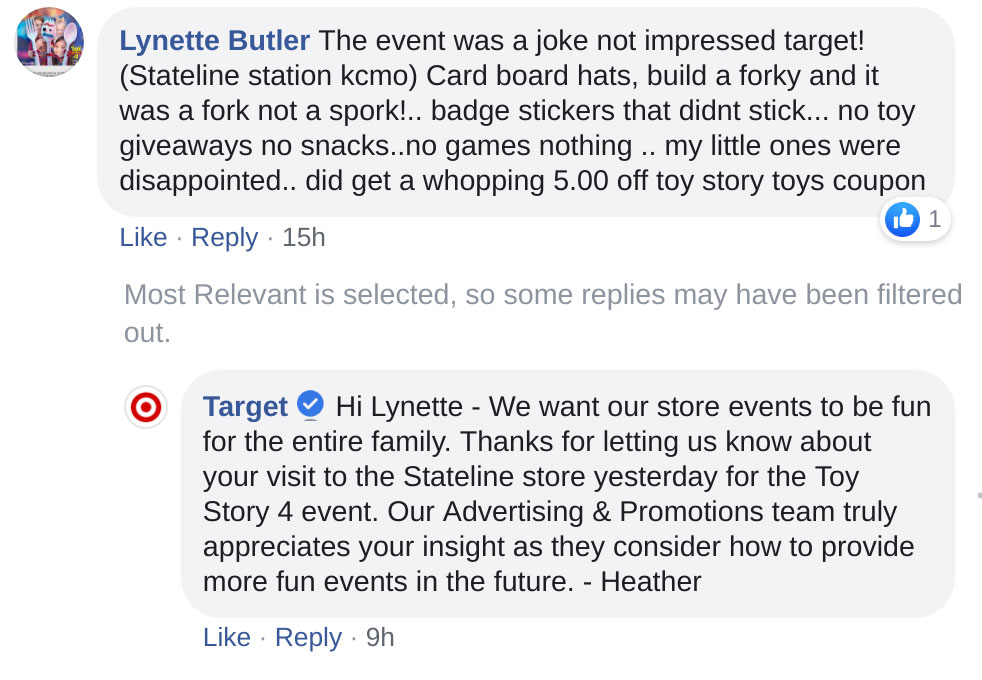
The more popular or engaged a post is on social media, the more likely it is to appear within the newsfeeds and timelines of users and prospective attendees you wish to reach.
5. Create Inclusive Invitations
Inclusivity is a great tool used by professional marketers and advertising strategists in almost all markets and industries today. Hosting an event that is inclusive and only for certain individuals such as social media followers or newsletter subscribers is a way to encourage engagement and activity on your social media pages. It is also a way to pique the interest of prospective users or customers who may have a genuine need or use for your business and brand.
Hosting incisive or even exclusive virtual events can leave others wanting more from your business and brand or reserving their spots for future virtual events as quickly as possible to avoid missing out.
We hope that you found this article useful.
If you want to know more interesting about your site health, get personal recommendations and alerts, scan your website by Diib. It only takes 60 seconds.
6. Prepare for Potential Technical Difficulties
Whenever you are planning to host virtual events it is important to consider potential technical difficulties, hangups, and complications that you may face and encounter throughout the event itself.
While you are planning your virtual event, consider which software or service you intend to use to host the event itself. Are you planning to host your virtual webinar on your own website or with the use of a live streaming software that is your own, or are you planning to use Facebook live streaming or another live streaming service that is dependable and reliable for your hosting needs?
Be sure to consider the following technical issues you may face when you are planning to host a virtual event of your own:
- Internet Connection: What type of internet connection will you be using when hosting your virtual event? Do you require a local internet connection, or is your wireless internet connection reliable enough to remain online without issue as you stream?
- Multiple Connections: Will you be hosting more than one individual in your virtual event? If so, how will they be connected to the internet? Do they require a better internet connection before going live?
- Attendee Count: How many attendees are you planning to host in your first virtual event? Does the number of attendees impact the connection within your virtual event?
- Remedies: If you should become disconnected or if you are experiencing lag and other choppy issues while streaming your live event, what remedies and solutions do you intend to implement? How do you intend to fix, mitigate, and/or resolve issues that may arise while you are in the middle of your event to ensure it does not take away from the overall experience of the event itself for your attendees?
7. Provide Follow-Up Emails and Communications
If one of your main goals for your upcoming virtual event is to stand out and to ensure that it is as successful as possible, provide follow-up emails and communications with your attendees. Using your newsletter or another email marketing strategy, send follow-up emails for those who did attend your virtual event. For instance:
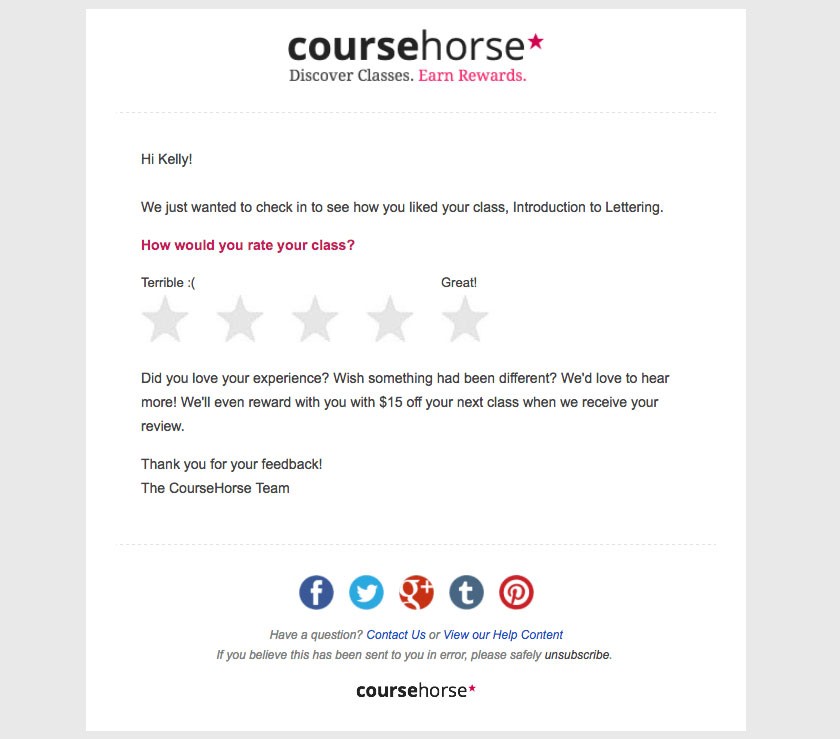
(Image Credit: Beefree.io)
You can also use email newsletters and registration emails to send follow-up emails to individuals who registered for an event or reserved a spot as an attendee but did not actually attend themselves. Using follow-up emails and communications helps to keep in contact with those who are genuinely interested in your business and brand as you solidify your place in the market.
Diib®: Stats that Can Make Any Virtual Event Successful!
Hosting a virtual event does not have to feel complicated or challenging, especially once you are familiar with the type of virtual events you can host as well as how to host virtual events in a way that best benefits your business and brand. Taking time to learn how to host a virtual event is one of the best ways for you to establish an online presence that is not only branded and professional, but one that is useful and authoritative in any industry you choose.
Partnering with Diib Digital can offer the vital statistics you need to make strategic business decisions. Here are some of the features that can help with that:
- Keyword, backlink, and indexing monitoring and tracking tools
- Google Core Algorithm monitoring
- Platform specific demographics
- Alerts to broken pages where you have backlinks (404 checker)
- Alerts and Objective that guide you to strengthen your website
- Monthly call with a growth expert
Click here for your free 60 second site analysis and industry ranking or call 800-303-3510 to speak with one of our Growth Experts.
FAQ’s
In this time of a worldwide pandemic, virtual events are the go-to event. A virtual event is one where the attendees experience the class or content online rather than gathering in person.
A good webinar from your favorite chiropractor, an online yoga course, an employee video conference, even church can be a virtual event. Chances are you’ve already attended a virtual event and just didn’t realize it.
- Identify your goals
- Get to know the event organizers and their bios
- Engage in/participate in discussions
- Build a community around your brand
- Share photos and updates of your event on social media
There are so many ways to draw people into your online event. 1) make sure you have exciting content and speakers/guests. 2) Use digital channels to gain enthusiasm. 3) Find the right hosting platform. 4) Set up reminders and agendas to keep ideas alive. 5) Try live events. 6) Encourage question and answer or live polls.



